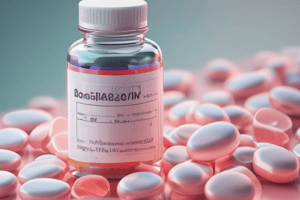Podcast
Questions and Answers
A patient is prescribed rifampin. Which adverse effect is most important for the nurse to educate the patient about?
A patient is prescribed rifampin. Which adverse effect is most important for the nurse to educate the patient about?
When administering IV vancomycin, which finding indicates Red Man Syndrome?
When administering IV vancomycin, which finding indicates Red Man Syndrome?
A patient is prescribed Ciprofloxacin. Which of the following should the nurse teach the patient?
A patient is prescribed Ciprofloxacin. Which of the following should the nurse teach the patient?
Which laboratory value is most important for the nurse to monitor in a patient receiving amphotericin B?
Which laboratory value is most important for the nurse to monitor in a patient receiving amphotericin B?
Signup and view all the answers
After administering penicillin, a patient develops an anaphylactic reaction. What is the priority nursing action?
After administering penicillin, a patient develops an anaphylactic reaction. What is the priority nursing action?
Signup and view all the answers
For a patient receiving gentamicin, which assessment finding is most indicative of ototoxicity?
For a patient receiving gentamicin, which assessment finding is most indicative of ototoxicity?
Signup and view all the answers
A patient taking lactulose to manage hepatic encephalopathy is monitored for effectiveness. Which lab value indicates that medication is working?
A patient taking lactulose to manage hepatic encephalopathy is monitored for effectiveness. Which lab value indicates that medication is working?
Signup and view all the answers
A patient with a known penicillin allergy is prescribed a medication. Which medication is most important for the nurse to clarify with the provider?
A patient with a known penicillin allergy is prescribed a medication. Which medication is most important for the nurse to clarify with the provider?
Signup and view all the answers
Flashcards
Dosage calculation
Dosage calculation
The process of determining the correct amount of medication to administer.
Rifampin adverse effects
Rifampin adverse effects
Common adverse effects include liver damage, orange-colored bodily fluids, and GI disturbances.
Red Man Syndrome
Red Man Syndrome
A reaction to IV Vancomycin characterized by flushing and rash; can be prevented by slowing the infusion.
Ciprofloxacin adverse side effects
Ciprofloxacin adverse side effects
Signup and view all the flashcards
Gentamycin toxicity
Gentamycin toxicity
Signup and view all the flashcards
Penicillin allergy manifestations
Penicillin allergy manifestations
Signup and view all the flashcards
Contraindications for cephalosporin
Contraindications for cephalosporin
Signup and view all the flashcards
Laboratory tests for TB treatment
Laboratory tests for TB treatment
Signup and view all the flashcards
Study Notes
Dosage and Calculations
- Calculate dosages accurately.
Adverse Effects of Medications
- Rifampin adverse effects.
- Enteric-coated aspirin information.
- IV vancomycin administration, including Red Man Syndrome prevention.
- Ciprofloxacin adverse effects.
- Amphotericin B contraindications and adverse effects, monitoring laboratory values.
- Penicillin anaphylaxis priority actions.
- Gentamicin peak and trough levels, topical application, and toxicity prevention.
- Lactulose lab monitoring.
- Zidovudine adverse effects.
- Nystatin storage and administration client education.
- Metronidazole adverse effects, including lab monitoring for tuberculosis treatment.
- Rifampin and pyrazinamide treatments and lab monitoring.
- Penicillin allergy manifestations, contraindications for cephalosporins.
- Erythromycin adverse effects.
- Oxacillin allergic reactions.
- Medication compatibility resources.
- Penicillin allergy and contraindicated medications.
- Amoxicillin-clavulanate allergic reaction manifestations.
- Urinary tract infections (UTIs); risk factors for pyelonephritis.
- Urinary retention risk factors.
- Osteoporosis risk factors.
- Passive range of motion (ROM) benefits.
- Medication administration errors and priority actions.
- IV medication administration adverse effects (phlebitis, infiltration).
- Colchicine adverse effects.
- Gout treatment medications.
- Diazepam client education and side effects.
- Cyclobenzaprine side effects.
Studying That Suits You
Use AI to generate personalized quizzes and flashcards to suit your learning preferences.
Related Documents
Description
This quiz covers critical aspects of medication dosages and the adverse effects associated with various drugs. Participants will assess their understanding of common medications like Rifampin, Ciprofloxacin, and more, along with necessary calculations and monitoring. Gain insights into effective medication management and safety practices.




